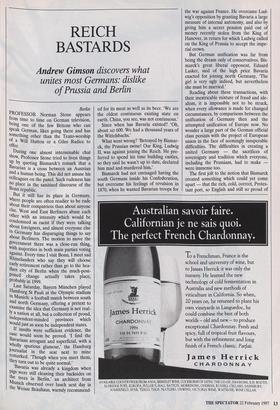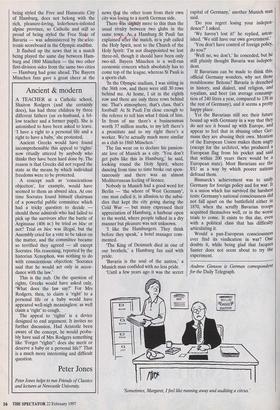REICH BASTARDS
Andrew Gimson discovers what
unites most Germans: dislike of Prussia and Berlin
Berlin PROFESSOR Norman Stone appears from time to time on German television, being one of the few Britons who can speak German, likes going there and has something other than the Teuto-worship of a Will Hutton or a Giles Radice to offer.
During one almost interminable chat show, Professor Stone tried to liven things up by quoting Bismarck's remark that a Bavarian is a cross between an Austrian and a human being. This did not amuse his colleagues on the panel. Such rudeness has no place in the sanitised discourse of the Bonn republic. But it still has its place in Germany, where people are often readier to be rude about their compatriots than about anyone else. West and East Berliners abuse each other with an intensity which would be condemned as racist if they were talking about foreigners, and almost everyone else In Germany has disparaging things to say about Berliners. The motion to move the government there was a close-run thing, With majorities in both main parties voting against. Every time I visit Bonn, I meet sad Rhinelanders who say they will choose early retirement rather than go to the hea- then city of Berlin when the much-post- poned change actually takes place, probably in 1999. Last Saturday, Bayern Miinchen played Hamburg St Pauli at the Olympic stadium in Munich: a football match between south and north Germany, offering a pretext to examine the idea that Germany is not real- ly a nation at all, but a collection of proud, independent-minded provinces which would just as soon be independent states. If insults were sufficient evidence, the case would soon be proved. 'I find the Bavarians arrogant and superficial, with a wholly spurious glamour,' the Hamburg Journalist in the seat next to mine remarked, 'Though when you meet them, they turn out to be quite normal.' Bavaria was already a kingdom when pigs were still cleaning their backsides on the trees in Berlin,' an architect from Munich observed over lunch next day in the Weisse Brauhaus, warmly recommend- ed for its meat as well as its beer. 'We are the oldest continuous existing state on earth. China, you see, was not continuous.'
Since when has Bavaria existed? 'Oh, about AD 600. We had a thousand years of the Wittelsbachs.'
What went wrong? 'Betrayed by Bismar- ck, the Prussian swine! Our King, Ludwig II, was against joining the Reich. He pre- ferred to spend his time building castles, so they said he wasn't up to date, declared him mad and murdered him.'
Bismarck had not envisaged having the south Germans inside his Confederation, but overcame his feelings of revulsion in 1870, when he wanted Bavarian troops for the war against France. He overcame Lud- wig's opposition by granting Bavaria a large measure of internal autonomy, and also by giving him a secret pension paid out of money recently stolen from the King of Hanover, in return for which Ludwig called on the King of Prussia to accept the impe- rial crown.
But German unification was far from being the dream only of conservatives. Bis- marck's great liberal opponent, Eduard Lasker, said of the high price Bavaria exacted for joining north Germany, 'The girl is very ugly indeed, but nevertheless she must be married.'
Reading about these transactions, with their inextricable mixture of fraud and ide- alism, it is impossible not to be struck, when every allowance is made for changed circumstances, by comparisons between the unification of Germany then and the attempted unification of Europe now. No wonder a large part of the German official class persists with the project of European union in the face of seemingly insuperable difficulties. The difficulties in creating a united Germany — the sacrifices of sovereignty and tradition which everyone, including the Prussians, had to make were immense too.
The first jolt to the notion that Bismarck created something which could yet come apart — that the rich, cold, correct, Protes- tant port, so English and still so proud of being styled the Free and Hanseatic „City of Hamburg, does not belong with the rich, pleasure-loving, lederhosen-infested alpine province, so Catholic and still so proud of being styled the Free State of Bavaria — was administered by the ielec- tronic scoreboard in the Olympic staditim.
It flashed up the news that in a match being played the same day between Ham- burg and 1860 Munchen — the two other first-division sides from the same two cities — Hamburg had gone ahead. The Bayern Miinchen fans gave a great cheer at the news tligt the other team from their own city was losing to a north German side.
There 7,r'as slivglitly more to this than the usual rivalry between two clubs in the same ..town. ,As a Hamburg St Pauli fan explained' after the match, in la pub called the Holy Spirit, next to the Church of the Holy Spirit: 'I'm not disappointed we lost three-nil, though it should have been only two-nil. Bayern Miinchen is a well-run economic concern which absolutely has to come top of the league, whereas St Pauli is a sports club.
`In the Olympic stadium, I was sitting in the 36th row, and there were still 30- rows behind me. At home, I sit in the eighth row and there are only three rows behind me. That's atmosphere, that's class, that's football! At St Pauli I'm close enough to the referee to tell him what I think of him. In front of me there's a businessman worth 37 million marks, to my left there's a prostitute and to my right there's a worker. We're actually much more similar as a club to 1860 Miinchen.'
The fan went on to declare his passion- ate love of Munich as a city. 'You don't get pubs like this in Hamburg,' he said, looking round the Holy Spirit, where dancing from time to time broke out spon- taneously and there was an almost Mediterranean feeling of licence.
Nobody in Munich had a good word for Berlin — 'the whore of West Germany', one man called it, in allusion to the subsi- dies that kept the city going during the Cold War — but many expressed their appreciation of Hamburg, a harbour open to the world, where people talked in a dry manner but pleasure was not unknown.
`I like the Hamburgers. They think before they speak,' a hotel manager com- mented.
`The King of Denmark died in one of our brothels,' a Hamburg fan said with pride.
`Bavaria is the soul of the nation,' a Munich man confided with no less pride. `Until a few years ago it was the secret capital of Germany,' another Munich man said.
`Do you regret losing your indepen- dence?' I asked.
`We haven't lost it!' he replied, aston- ished. 'We still have our own government.'
`You don't have control of foreign policy, do you?'
`Well no, we don't,' he conceded, but he still plainly thought Bavaria was indepen- dent.
If Bavarians can be made to think this, official Germany wonders, why not those troublesome Britons? Bavaria is drenched in history, and dialect, and religion, and royalism, and beer (an average consump- tion of 240 litres a year, compared to 138 in the rest of Germany), and it seems a pretty happy place.
Yet the Bavarians still see their future bound up with Germany in a way that they do not see it bound up with Europe, and appear to feel that in abusing other Ger- mans they are abusing their own. Mention of the European Union makes them angry (except for the architect, who produced a European flag from his pocket and said that within 200 years there would be a European state). Most Bavarians see the EU as a way by which poorer nations defraud them.
Bismarck's achievement was to unify Germany for foreign policy and for war. It is a union which has survived the harshest tests: Germany's national consciousness did not fall apart on the battlefield either in 1870, when the scruffy Bavarian troops acquitted themselves well, or in the worse trials to come. It exists to this day, even with a political class that has difficulty articulating it.
Would a pan-European consciousness ever find its vindication in war? One doubts it, while being glad that Jacques Santer does not seem about to try the experiment.
Andrew Gimson is German correspondent for the Daily Telegraph.
`Sometimes, Margaret, I feel like running away and auditing a circus.'



























































 Previous page
Previous page